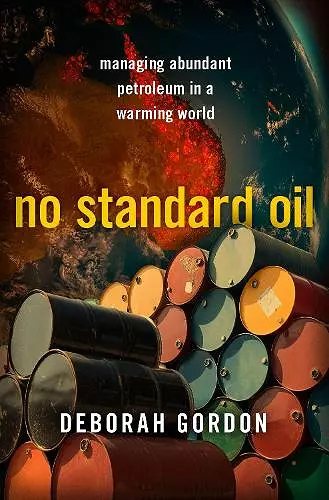No Standard Oil
Managing Abundant Petroleum in a Warming World
Format:Hardback
Publisher:Oxford University Press Inc
Published:30th Dec '21
Currently unavailable, and unfortunately no date known when it will be back

In No Standard Oil, environmental policy expert Deborah Gordon examines the widely varying climate impacts of global oils and gases, and proposes solutions to cut greenhouse gas emissions in this sector while making sustainable progress in transitioning to a carbon-free energy future. The next decade will be decisive in the fight against climate change. It will be impossible to hold the planet to a 1.5o C temperature rise without controlling methane and CO2 emissions from the oil and gas sector. Contrary to popular belief, the world will not run out of these resources anytime soon. Consumers will continue to demand these abundant resources to fuel their cars, heat their homes, and produce everyday goods like shampoo, pajamas, and paint. But it is becoming more environmentally damaging to supply energy using technologies like fracking oil and liquefying gas. Policymakers, financial investors, environmental advocates, and citizens need to understand what oil and gas are doing to our climate to inform decision-making. In No Standard Oil, Deborah Gordon shows that no two oils or gases are environmentally alike. Each has a distinct, quantifiable climate impact. While all oils and gases pollute, some are much worse for the climate than others. In clear, accessible language, Gordon explains the results of the Oil Climate Index Plus Gas (OCI+), an innovative, open source model that estimates global oil and gas emissions. Gordon identifies the oils and gases from every region of the globe-along with the specific production, processing, and refining activities-that are the most harmful to the planet, and proposes innovative solutions to reduce their climate footprints. Global climate stabilization cannot afford to wait for oil and gas to run out. No Standard Oil shows how we can take immediate, practical steps to cut greenhouse gas emissions in the crucial oil and gas sector while making sustainable progress in transitioning to a carbon-free energy future.
Gordon is trained as a chemical engineer but thinks like an economist. * Barry Eichengreen, Foreign Affairs *
In No Standard Oil, Deborah Gordon showcases the unrivalled knowledge that she and her Oil Climate Index Plus Gas (OCI+) colleagues have built up of the climate impacts of oil and gas supply. This is essential reading for anyone looking to truly understand how oil and gas contribute to climate change, and how the supply side can help to solve the problem. * Simon Dietz, Professor of Environmental Policy, Grantham Research Institute on Climate Change and the Environment, London School of Economics *
An anatomy of hydrocarbons worthy of Leonardo da Vinci, No Standard Oil dissects the oil and gas industries to rank the sources of damage to the environment, the economic factors at play, how best to tailor efforts to mitigate climate change, who might do it, and the principles for triage in the industry as they do. * Chas Freeman, Former Ambassador to Saudi Arabia *
Cleaning up today's fuel supply chains is an integral but often overlooked part of the drive towards net zero emissions. Debbie Gordon spells out with admirable clarity the scale of the problem, the huge variations in environmental performance across different parts of the oil and gas industry, and the strategies and data that can make a difference. * Tim Gould, Chief Energy Economist, International Energy Agency *
Californians have a deep and complicated relationship with oil. The birth of the modern environmental movement coincides with a 1969 oil spill in the Santa Barbara Channel that killed thousands of sea birds and left blobs of tar on the beaches for months. Revenue from oil production on State lands still significant. And combustion of petroleum products for transportation remains the biggest contributor to global warming. The analytical approach described in No Standard Oil provides a sophisticated tool that undergirds California's groundbreaking Low Carbon Fuel Standard, the most effective policy to date for bringing new, more sustainable fuels to market. * Mary Nichols, Chair of the California Air Resources Board *
ISBN: 9780190069476
Dimensions: 166mm x 236mm x 32mm
Weight: 671g
368 pages